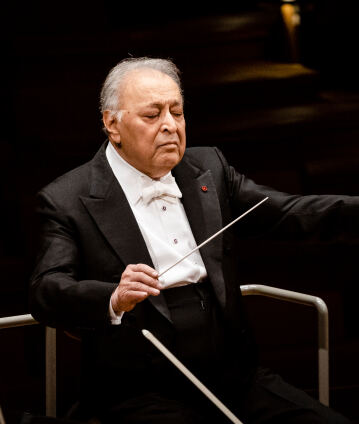Zubin Mehta conducts Bruckner and Messiaen

A century separated Olivier Messiaen and Anton Bruckner, but they had a lot in common: both were among the leading organists of their time, and both were deeply rooted in the Catholic faith. Zubin Mehta combines Messiaen’s Et exspecto resurrectionem mortuorum, a memorial to the dead of both world wars, with Bruckner’s Ninth Symphony. It is not only the summation of the Austrian composer’s work but also a personal farewell to this world.
Anton Bruckner and Olivier Messiaen have in common that their instrumental works served a religious purpose. And yet, since the First Viennese School, instrumental music had actually been considered a secular matter. It is no coincidence that Beethoven in his Ninth Symphony and Mendelssohn in his Second Symphony used the text sung by soloists and choruses to invoke the praise of the Creator. For Bruckner and Messiaen, on the other hand, certain chord combinations, harmonic progressions and the overall architecture of their compositions represented the expression of their deep faith.
According to one oral account, Bruckner dedicated his Ninth and last symphony “to the beloved God”. Even on his deathbed, he is said to have pleaded to be given the time needed to complete the work. But in vain. When he died, the composer left only three completed movements and extensive sketches for the finale. The symphony ends with the magnificent Adagio and without a return to the home key of D minor.
In 1964, Olivier Messiaen was commissioned by the then French Minister of Culture, André Malraux, to write music in memory of the victims of both world wars. Unusually scored for wind orchestra and percussion, he prefaced the five movements of his composition Et exspecto resurrectionem mortuorum with biblical quotations. The title, whose translation is “and I await the resurrection of the dead”, is part of the Credo section in the text of the Latin Mass.
Zubin Mehta has turned to Bruckner’s late symphonies with the Berliner Philharmoniker several times in recent years. Messiaen’s composition has also been on a joint programme before: in 1980, Mehta juxtaposed it with Schubert’s Symphony in C Major, another great valedictory work.
© 2021 Berlin Phil Media GmbH
Related interview
Artists
Our recommendations
- Joint concert from Israel with the Israel Philharmonic Orchestra and Zubin Mehta
- Anniversary concert with Zubin Mehta and Mahler’s First Symphony
- Zubin Mehta conducts Saint-Saëns’s “Organ Symphony”
- Zubin Mehta conducts Bruckner’s Eighth Symphony
- The 1995 Europakonzert from Florence with Zubin Mehta and Sarah Chang
- Beethoven’s Violin Concerto with Leonidas Kavakos and Zubin Mehta